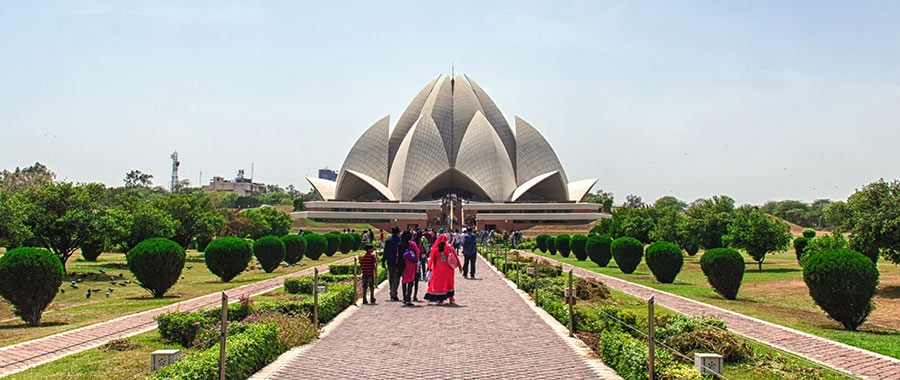The views expressed in our content reflect individual perspectives and do not represent the authoritative views of the Baha'i Faith.
At my community’s recent interfaith International Peace Day celebration, a local minister asked me: “How do Baha’is worship together if you don’t have a church?”
Before I tell you how I answered, let’s explore the Baha’i concept of worship, thinking for a minute about the broader implications of the word. What does it really mean to worship?
First, it always helps to define the word:
worship v. 1. to show religious reverence for 2. To have intense love or admiration for
Our contemporary word worship comes from the Old English term weorthscipe, which meant “to show honor” or to “give worth (worth-ship)” to something or someone. Since worship is one of the oldest human activities, multiple words exist to describe it:
- In the Bible, initially written in Aramaic, the word for worship—proskuneo—meant “to bow down, to prostrate oneself before God”
- In Buddhism, the Pali and Sanskrit word for worship—puja—means giving honor and devotional attention
- For Hindus, the word for worship—bhakti—means the expression of devotional love
- In Islam, the concept of ibadah means obedience, submission and devotion to God
- In Judaism, Avodat Hashem means worshipping God through prayer, devotion and meditation.
For the believers in many Faiths, attending weekly or daily worship services became a ritual long ago. Certain prescribed prayers, rites and actions usually accompany that kind of congregational worship, and in some cases those old forms of expressing piety and belief have persisted for centuries, becoming rigid and dogmatic.
When you join or are born into one of those traditions, everyone is expected to take part, with worship services typically led by the clergy, who sometimes deliver sermons that present a particular theology as absolute truth or admonish the congregation for their sins and shortcomings. In this kind of worship, the rabbi, the priest, the minister, the monk, the guru or the mullah takes on the mantle of authority and leadership, and the congregation listens and follows.
Gradually the outward forms of those worship traditions can take on a life of their own, supplanting and displacing the symbolic inner significance they originally meant to convey. Those forms then tend to separate people, acting as a determinant of their identity. In some extreme cases, worship services in many sects and denominations result in the development of dogma that encourages a separate group consciousness, a division that often excludes or demonizes others. Some conservative religious groups even wear different clothing or hairstyles to set them apart from those who don’t worship or believe the same way.
The Baha’i teachings—with their emphasis on individual spiritual search for the truth and the absence of any clergy or ritual—have none of those elements. In fact, the Baha’i writings describe this kind of exclusionary, dogmatic worship as detrimental to the real spirit of faith:
Most regrettable of all is the state of difference and divergence we have created between each other in the name of religion, imagining that a paramount duty in our religious belief is that of alienation and estrangement, that we should shun each other and consider each other contaminated with error and infidelity. In reality the foundations of the divine religions are one and the same. The differences which have arisen between us are due to blind imitations of dogmatic beliefs and adherence to ancestral forms of worship. – Abdu’l-Baha, The Promulgation of Universal Peace, p. 403.
This means Baha’is have a very different definition of worship than the ones you’re probably used to or familiar with. No rigid Baha’i rites or rituals exist. Baha’is are free to worship as they see fit. Without any clergy, no individual Baha’i has more authority than any other Baha’i. When Baha’is gather for prayer, no one delivers a sermon or harangues and criticizes the people who attend.
Worship, for Baha’is, joins daily life directly to a sense of spirituality and service, unifying the individual act of worship with an aware and awakened kinship to all humanity.
Most importantly, Baha’i worship does away with the outward forms and superstitions inherent in so many traditions, and focuses solely on building a connection between each individual human being and the Source of all Being:
Take heed lest your devotions withhold you from Him Who is the object of all devotion, or your worship debar you from Him Who is the object of all worship. Rend asunder the veils of your idle fancies! This is your Lord, the Almighty, the All-Knowing, Who hath come to quicken the world and unite all who dwell on earth. – Baha’u’llah, The Summons of the Lord of Hosts, p. 55.
In fact, Baha’is view worship in a totally different way than ever before, linking it first to individual prayer and meditation; and then extending it much, much further, to the work each of us does and the selfless service we offer to all humanity—a radical departure from the current conception of what it means to worship.
In this series of essays, we’ll examine how Baha’is worship, and see how those new spiritual practices play out in their daily lives.
I almost forgot—I promised, at the beginning of this essay, to tell you how I answered the Christian minister who asked how Baha’is worship without a church. Hoping to answer in terms he would immediately understand, I responded with a question: “When do you think the very first Christian church was built?”
“Well,” he said, “that would probably be in Jerusalem, built after 325 AD by King Constantine and his mother Helena. Before then, the earliest Christians gathered in small private homes. They called them house churches.” As he answered, he began to understand, and nod, and smile.
















Comments
Sign in or create an account
Continue with Googleor